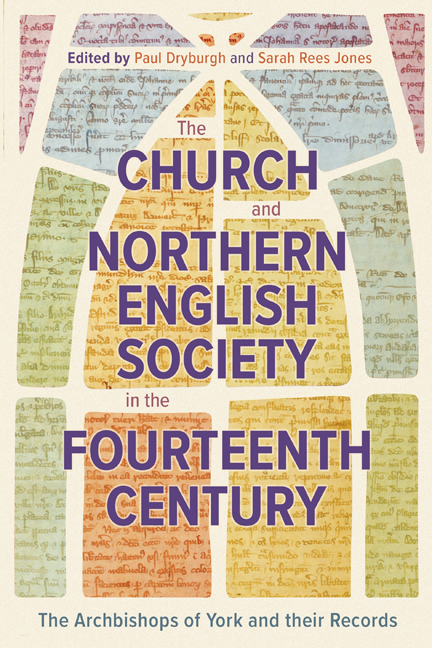 The Church and Northern English Society in the Fourteenth Century
The Church and Northern English Society in the Fourteenth Century Book contents
- Frontmatter
- Dedication
- Contents
- List of Illustrations
- List of Contributors
- Acknowledgements
- List of Abbreviations
- Map: The Ecclesiastical Province of York, c. 1304–1405
- Introduction
- 1 The Administrative Records of the Archbishops of York, 1304–1405
- 2 The Archbishops of York and the Government of Fourteenth-Century England
- 3 Support or Scourge? Archbishop William Melton and the Tradition of Loyal Opposition to the English
- 4 Beyond the Border: The Influence of York Clerks in the Two Edwards’ Scottish Administrations, 1332–1357
- 5 Responding to Royal Requirements: Clerical Taxation in the Province of York, 1304–1405
- 6 Ad insolenciam ipsius rebellis salubrius reprimendam: William Thorntoft, the Abbey of Rufford and Significations of Excommunication in the Northern Province
- 7 Blood, Sex and Holy Water: Reconciling Churches and Churchyards in the Medieval Diocese of York
- 8 Structuring Episcopal Authority: Palaces and Residences of the Archbishop of York
- 9 Medieval Parks of the Archbishops of York
- 10 Northern Ways? Pilgrimage, Politics and Piety in the Fourteenth-Century Administrative Records of the Archdiocese of York
- 11 Underexplored Sources for Gender History: New Approaches to the Fourteenth-Century York Archbishops’ Registers
- 12 Joan of Leeds and other Apostate Nuns in the Province of York, 1300–1350
- Bibliography of Records of the Archbishops of York, 1304–1405
- Index
3 - Support or Scourge? Archbishop William Melton and the Tradition of Loyal Opposition to the English
Published online by Cambridge University Press: 17 May 2024
- Frontmatter
- Dedication
- Contents
- List of Illustrations
- List of Contributors
- Acknowledgements
- List of Abbreviations
- Map: The Ecclesiastical Province of York, c. 1304–1405
- Introduction
- 1 The Administrative Records of the Archbishops of York, 1304–1405
- 2 The Archbishops of York and the Government of Fourteenth-Century England
- 3 Support or Scourge? Archbishop William Melton and the Tradition of Loyal Opposition to the English
- 4 Beyond the Border: The Influence of York Clerks in the Two Edwards’ Scottish Administrations, 1332–1357
- 5 Responding to Royal Requirements: Clerical Taxation in the Province of York, 1304–1405
- 6 Ad insolenciam ipsius rebellis salubrius reprimendam: William Thorntoft, the Abbey of Rufford and Significations of Excommunication in the Northern Province
- 7 Blood, Sex and Holy Water: Reconciling Churches and Churchyards in the Medieval Diocese of York
- 8 Structuring Episcopal Authority: Palaces and Residences of the Archbishop of York
- 9 Medieval Parks of the Archbishops of York
- 10 Northern Ways? Pilgrimage, Politics and Piety in the Fourteenth-Century Administrative Records of the Archdiocese of York
- 11 Underexplored Sources for Gender History: New Approaches to the Fourteenth-Century York Archbishops’ Registers
- 12 Joan of Leeds and other Apostate Nuns in the Province of York, 1300–1350
- Bibliography of Records of the Archbishops of York, 1304–1405
- Index
Summary
The statue in the central niche over the West Door of York Minster is a modern rendering of William Melton, the archbishop of York from 1317 to 1340 and the prelate under whom the great rebuilding of the West End of the cathedral church was undertaken. It is fitting to begin this paper with this ecclesiastical image, since it helps us to point up Melton's strong identity both with the Church at large and with the episcopal see of York in particular. Melton's career followed a pattern that was common in England throughout the high and later Middle Ages, whereby clerics who served conspicuously and loyally in the royal administration were rewarded, in the course of time, with episcopal sees. The consequences of such shifting foci, from state service to leadership in the Church, normally guaranteed that the king's interests would be well served both on the bench of bishops in parliament and in the inner workings of the dioceses and of the two ecclesiastical provinces of Canterbury and York.
But it was not always so. The most celebrated case of changed priorities came in the twelfth century with Thomas Becket, who transformed from a friend and minister of Henry II to an ideologically driven defender of the liberties of the Church and, of course, lost his life in the process. There were others who did the same, even if they did not always come to the same gruesome end as Becket. We think here of a series of archbishops of Canterbury, including Stephen Langton, Robert Winchelsey and John Stratford. Closer to home, the tradition of former royal servants turning into champions of the Church was just as strong and self-conscious in the Northern Province. Archbishop Thoresby of York resigned the office of royal chancellor in 1356 as a result of a major row with Edward III over the treatment of the wayward bishop of Ely, Thomas de Lisle; and in 1405, of course, Archbishop Richard Scrope was summarily executed for his leadership of an armed uprising against King Henry IV. In all of these various stands taken by archbishops of Canterbury and York during the thirteenth, fourteenth and fifteenth centuries, there was an element of martyrdom, built sometimes quite self-consciously on the cult of St Thomas Becket, whose tomb at Canterbury Cathedral was of course the premier and most visited shrine in the whole of England.6
- Type
- Chapter
- Information
- The Church and Northern English Society in the Fourteenth CenturyThe Archbishops of York and their Records, pp. 109 - 127Publisher: Boydell & BrewerPrint publication year: 2024


